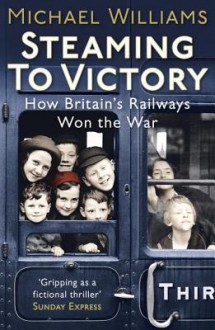Steaming to Victory: How Britain's Railways Won the War
During the Second World War, the British railways were the lifeline of the nation. Nearly 400 heroic railwaymen and women were killed at their posts and another 2,400 were injured in the line of duty. The trains played just as vital a role transporting troops, munitions and food, evacuating...
show more
During the Second World War, the British railways were the lifeline of the nation.
Nearly 400 heroic railwaymen and women were killed at their posts and another 2,400 were injured in the line of duty. The trains played just as vital a role transporting troops, munitions and food, evacuating children and sheltering people on underground platforms at night.
In 1943 Churchill praised 'the unwavering courage and costant resourcefulness of railwaymen of all ranks in controbuting so largely towards the final victory'.
In fact, without the railways, there would have been no Dunkirk evacuation and no D-Day.
This is their story.
show less
Format: paperback
ISBN:
9780099557678 (0099557673)
Publish date: 2014-03-27
Publisher: Arrow
Pages no: 384
Edition language: English

When Britain went to war in 1939, they did so by rail. For at a time when air travel was enjoyed only by the few and automobiles nowhere nearly as ubiquitous as they would become, railways were the dominant form of long-distance transportation in the country. This was underscored over the next six y...

